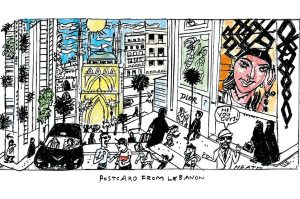In the Atlantic, Leslie Kendall Dye tells us what the placement of books on her shelves tells us about her interests, her associations and her opinions:
Sometimes I stop in the center of my own home like a bird arrested in flight, entranced by the books that line my walls. I live in a small Manhattan apartment, and I, too, have books in the living room, the bedroom, the hallway, the closets. Often, I stare at them because I’m puzzling over their geography. I wonder if I’ve placed any book in the wrong spot, according to an emotional map I’ve made of my bookshelves. As I gaze at the titles, the associations come tumbling out. Tennessee Williams’s Memoirs is next to a biography of Patrick Dennis called Uncle Mame, because Williams and Dennis had many things in common: Pathos. Cruel fathers. Spectacular female characters. A Dictionary of Yiddish Slang & Idioms is next to Heartburn because, however secular Nora Ephron was, her humor comes from deep within her Jewishness. The Lord of the Rings is between Time and Again and Rosemary’s Baby because I like how they form a triumvirate of fantasy stories that have nothing in common save my personal opinion that they are the finest of their genre . . . And then there’s the shelf above my desk. It wouldn’t be entirely accurate to say that it’s where I keep my favorite books. A more esoteric logic is at work.
I’ll stop there because I can’t bring myself to quote more. You get the idea. She is a thoughtful, “esoteric” person because of the “emotional map” of her bookshelves. Does she really stare at her books “puzzling over their geography” or “gaze” at their spines while “associations come tumbling out”? Get out a little, Ms. Kendall Dye! Or pull a book off the shelf and read it!
Of course, everyone who owns books likes it when other people look at them and approve. Books are a little like children — an extension of oneself. But like parents who make up for their own failures by talking unendingly about little Suzie’s unending accomplishments, so, too, bookish folks can overcompensate for their lack of intelligence by talking about their books.
In other news
Dominic Green writes about the English jazz scene in his review of Alyn Shipton’s On Jazz: A Personal Journey:
Almost all non-American jazz is imitative. This is not as humiliating as it sounds, because almost all American jazz is imitative too. The first distinctively British jazz of any note came in 1965, with the pianist Stan Tracey’s jazz suite inspired by Dylan Thomas’s Under Milk Wood. The distinctively British part was not so much Tracey’s playing, which was very much in the line of Thelonius Monk, but in harnessing jazz to Dylan Thomas’s verse. But the jazz life in England is, for all the effort of its practitioners, helplessly English.
Speaking of music, what happened to classical music, Barton Swaim wonders in his review of John Mauceri’s The War on Music: Reclaiming the Twentieth Century? How is it that, as Mauceri puts it, “so much contemporary music played by our greatest musical institutions—and supported overwhelmingly by music critics—is music that the vast majority of people do not want to hear—and have never wanted to hear?” We can blame two world wars and the Nazis’ championing of composers people actually liked, Mauceri argues, which led post-war orchestras to ignore all compositions in an “accessible” style. Swaim doesn’t buy it:
The War on Music is fluently written and often cogent. Mr. Mauceri shows no patience with critics who sneer at the film music of midcentury composers such as Waxman, Korngold, Bernard Herrmann, Miklós Rózsa and Elmer Bernstein. Particularly delightful is the scorn he heaps on the idea of a perpetual, institutionalized avant-garde. But I am not persuaded by the book’s central argument. The world wars were horrible, but they don’t explain the embrace of incomprehensibility, obscurity and repugnance by the composers and musical institutions of Western nations.
Did you know that we have today’s post-it note thanks, in part, to church music?
Fry often used small slips of paper to mark important pages in his hymnbook, but with nothing to keep them in place they frequently fell out, causing Fry to lose his place and costing him precious time. One Sunday in 1973, during choir practice, he remembered Dr Silver’s seminar. He wondered if he could somehow coat his bookmarks with the adhesive in a way that could help save his page more effectively, without damaging the delicate, wafer-thin pages of his hymnbook.
Glen Sharp reads Padgett Powell’s collection of essays:
Craft is a major preoccupation of the essays that make up his 2021 collection Indigo, whether they be profiles of an arm wrestler or a musician or a painter or a fellow writer. Powell marvels not just at the creative intelligence of his subjects but also the practice of their specific disciplines. He quotes singer Debbie Harry to emphasize the importance of learning the basics of craft before one worries about becoming an artist: “Learn to play your instruments, then get sexy.” One compelling portrait here is of Juan Perez, drummer for the Beth McKee Band.
Elizabeth Corey on the perils of “public writing”:
Almost all the students I advise about graduate school now find public writing more appealing than traditional scholarly work. In some sense, this is hardly surprising: Scholarly writing is both less widely noticed and more difficult to undertake than public writing. It requires in-depth research, attribution, and engagement with sources that may be obscure or difficult. Whereas public writing on the internet may take only a few hours or days before delivering its satisfactions, scholarly work takes time and patience to bear fruit. And although tenure requirements are slow to change, even today’s universities increasingly prize work that is popular and accessible — a treatment for a certain kind of cancer, or an anti-racist training session in one’s hometown — over the arcane, though perhaps original and meaningful, work involved in fields like medieval philosophy or quantum physics. A key peril of public writing, however, is that it tends to place the writer at the center of the work. A desire to be seen, to be thought smart or witty or erudite, can — imperceptibly, at first — begin to overtake the writing itself. Writing for the public may, and often does, evolve into writing to develop a platform for the promotion of oneself as a commodity. As this shift occurs, the prose becomes more sensationalist — after all, most readers are attracted to provocation and find nuance boring. Moderation takes a backseat to extremes, judiciousness to hyperbole.
John P. Rossi reviews Geoffrey Wheatcroft’s Churchill’s Shadow: The Life and Afterlife of Winston Churchill: “Afterlife studies have become popular in the last half century as a way to understand the phenomenon of why a particular historical figure made a lasting impact and what that tells us about the state of historical understanding. Wheatcroft believes that Churchill suffered more from his hero worshippers than from his detractors. He sets out to correct that flaw with a vengeance.”


















